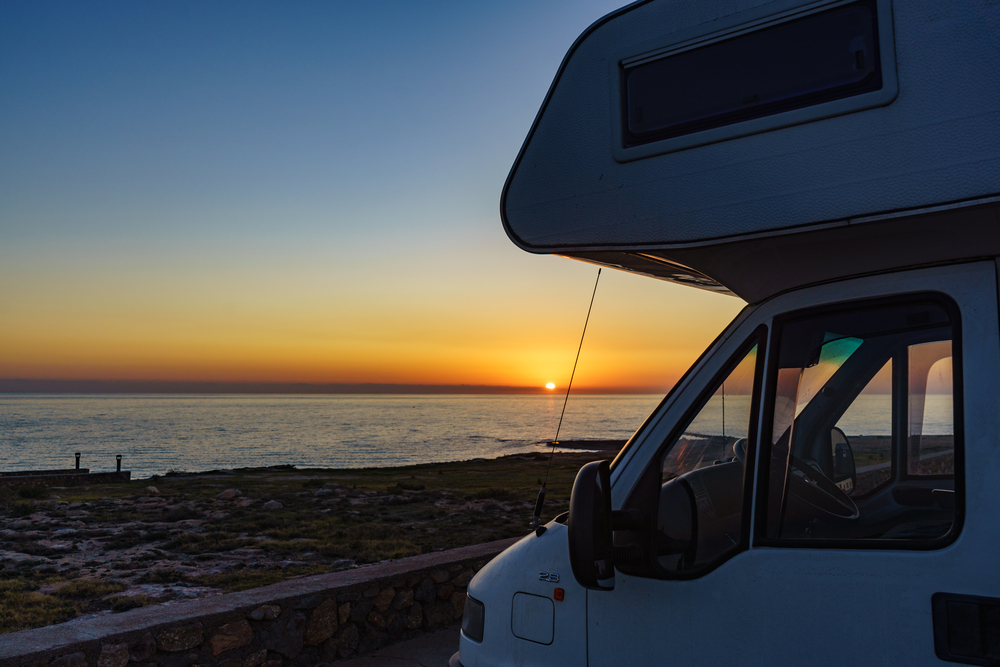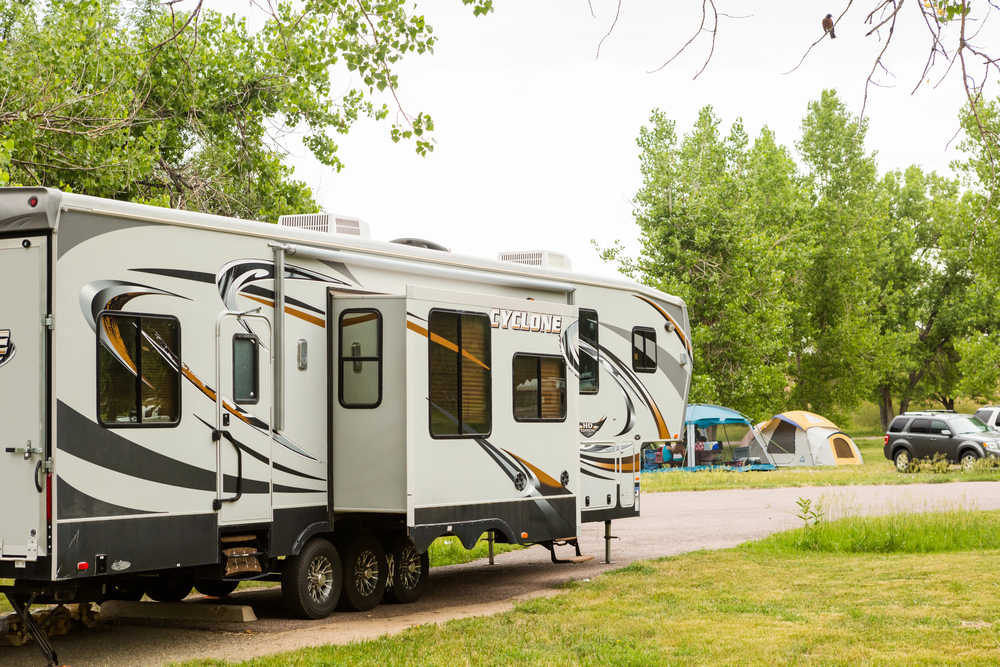So you think you’ll enjoy all that RV camping offers, but you just aren’t sure where to start. There are so many questions to answer to have a successful first camping trip. What do you pack? How much should you pack? How much should you expect to spend?
With the proper preparation, you’ll go from an RV camping novice to a cross-country adventurer in no time. Here’s the list of RV camping tips for beginners that will send you on your way.
1. Choose Your Budget and RV

Before you start buying your gear and making reservations at campsites, you first need to decide your budget and RV choice.
Your RV does not come camping-ready and your budget must include all the necessary gear you must add. RV’s can be towable or motorized (with or without towing capabilities themselves), and come in all different sizes and configurations. It’s up to you if you want to camp solo with little to no amenities like Bear Grylss. However, if glamping is more your style, you can choose a large RV with all the comforts from home.
2. Decide Between Renting Vs. Buying
Purchasing an RV before you ever take it camping is a hefty investment. If you are sure the camping life is for you, buying gives you the freedom to customize your RV. But, if you have never stepped foot on a campsite and are unsure if you will even like it, renting an RV is a budget-friendly way to figure that out before making a big purchase.
3. Make Your RV Camping Ready
After deciding on which RV is right for your camping needs, the next most important part of a successful camping trip is making sure your RV is as ready as you are for the adventure. Confirm all maintenance has been done to ensure you won’t run into issues on your trip. Bring tools and spare parts and follow a maintenance checklist to ensure a smooth trip.
4. Research and Reserve Early

Not all campgrounds are the same and it is important to research ahead of time to ensure the campground you will be staying at is the right fit for the type of trip you are planning. Some campgrounds allow pets while others don’t, some have quiet hours, and some have vehicle size restrictions.
Planning and booking early is important as some of the best campsites tend to fill up fast, some even six months in advance. For your first trip, it is best to reserve a private campground that will give you access to full hookups for water, electricity, and sewage until you get to know your rig better.
5. Camp Close to Home
A mistake some newbie campers make is taking to the open road too soon. Being a beginner at something means you are bound to make mistakes. Often called shakedown trips, these trips are a great form of practice allowing you to figure out your rig, what to bring, and how to plan for the unpredictable in a familiar environment.
6. Pack Right
A packing checklist is an important tool for a successful first camping trip. While you want to pack everything you need, it is important not to overpack as your RV will have a weight limit.
Camping close to home the first or first few times you camp is a great way to get a feel for just what and how much to pack. And if you forget something or run out, you are close to home and familiar shops.
7. Don’t Arrive at Night
Driving into a park or campground for the first time in your new vehicle is a challenge in and of itself, trying to do so at night can be next to impossible. As a newbie, setting your RV up for camp will already have a steep learning curve. Ensure you are giving yourself the best chance at success by not trying to do so in the pitch-black.
8. Expect the Unexpected
Part of what makes camping great is being one with nature. Part of what makes camping difficult is, well, being one with nature. It is important to be and stay prepared for potential bad weather, loss of cell service, and malfunctions within your RV. Make sure you download any maps you need for navigation, keep things like portable chargers and generators in your RV, and utilize camping and RV apps to aid you in a successful trip.
Depending on where you live, there might be options for you and your family to get hands-on camping experience before you dive head-first into the RV life. For instance, if you live here in Texas, Texas Parks and Wildlife provides camping workshops all over the state.
9. Plan and Prep Your Meals

If you don’t want to end up with a couple of packs of ramen and a group of hungry campers on your second to last day, you must plan your meals ahead of time. Meal planning will allow you to pack everything you need without risking under or over-packing. A great tip is to save on time and potentially greasy and smelly clean up, cook, and pack your meats ahead of time.
10. Ask for Help
While your RV can take you to some of the most secluded corners of nature, a lot of the time you will be camping alongside other campers. There is no better advice you can get than from seasoned RVers who have made the mistakes you are trying to avoid and learned from them.
RV Camping: From Beginner to Expert in One Trip
There is a lot that goes into a successful first RV camping experience and a lot that could go wrong if you aren’t properly prepared. But by utilizing this list of essential RV camping tips for beginners, you can stave off the frustrations that come with your first trip and enjoy all that a campground or RV resort has to offer.
You might have a few less funny stories of how things went wrong the first time you took your RV out, but you’ll have a lot more time to experience all that nature and your RV has to offer. Schedule your next RV trip at Southern Oaks RV Resort to start making these great memories.
